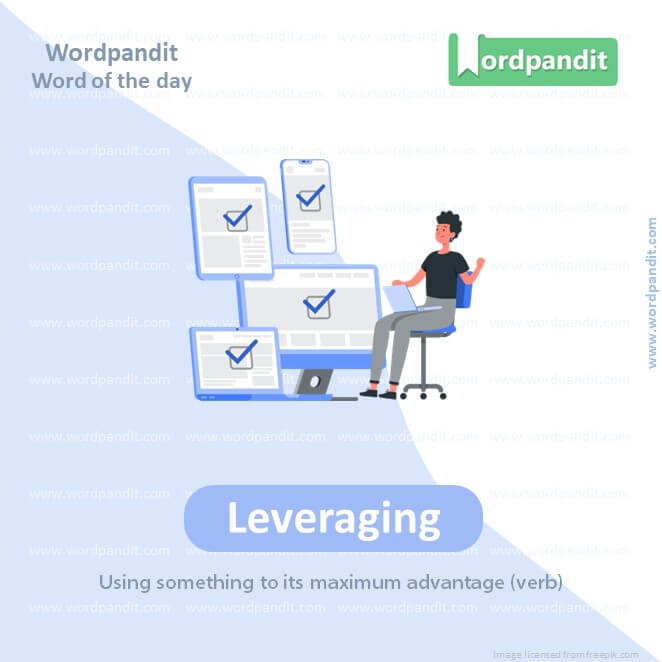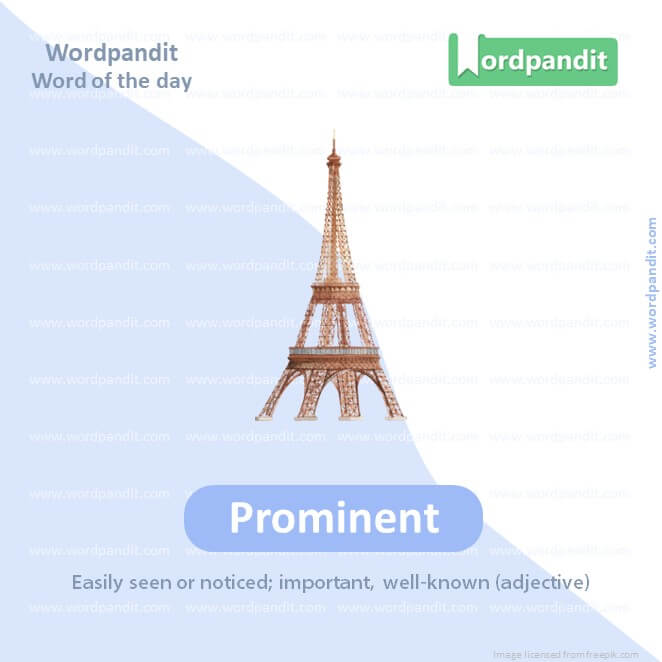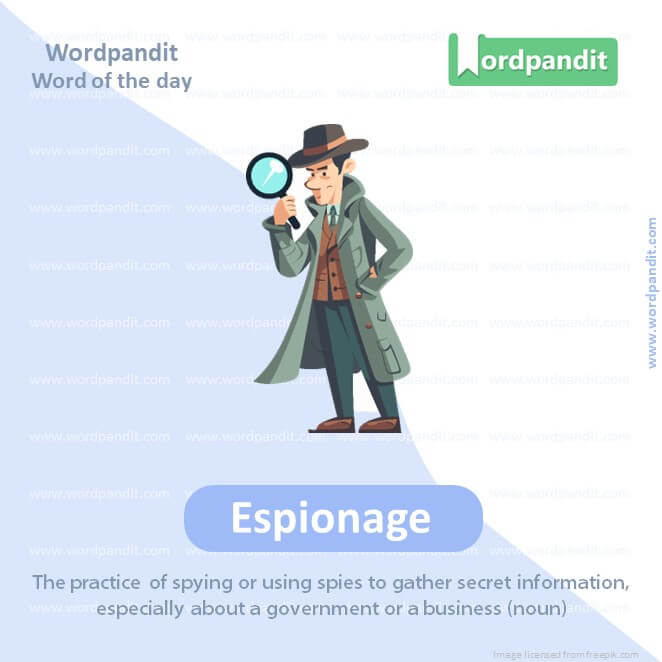Daily Vocabulary Words: Enhance Your Lexicon with Leading Newspapers & Publications
Welcome to the Daily Vocabulary section at Wordpandit!
Our mission is straightforward: to bring you essential vocabulary words featured in top newspapers and publications worldwide. By focusing on words you’ll encounter in renowned sources, we aim to help you enhance your vocabulary effectively and practically.
Our selection includes words from:
– The New York Times
– The Washington Post
– Scientific American
– BBC
– The Guardian
– Psychology Today
– Wall Street Journal
– The Economist
– The Hindu
– The Times of India
– The Economic Times
– Hindustan Times
– Live Mint
– The Indian Express
– And many more.
We are committed to your vocabulary development. Simply visit this section regularly and explore the daily posts. This is your go-to repository for commonly used words, providing significant practical benefits by familiarizing you with vocabulary from the leading publications listed above.
Make it a habit to visit our website daily and expand your lexicon with words from top newspapers and publications.

WORD-1: Antisemitic
CONTEXT: Antisemitic and Islamophobic hate is surging most dramatically online. A recent New York Times article reported that online hate has spiked on mainstream social media platforms like X (formerly Twitter), Facebook and Instagram, with most of the hateful antisemitic and Islamophobic content appearing on X. Far-right users of Telegram and 4chan have been leveraging the current conflict, the report noted, as an opportunity to spread antisemitic and Islamophobic rhetoric.
SOURCE: Scientific American
EXPLANATORY PARAGRAPH: Antisemitic refers to actions, speech, or attitudes that are hostile or prejudiced against Jewish people. Imagine someone spreading hateful ideas or making derogatory comments specifically targeting Jews—this is antisemitic behavior.
MEANING: Showing hostility or prejudice against Jews (adjective)
PRONUNCIATION: an-tee-suh-MIT-ik
SYNONYMS: Anti-Jewish, prejudiced, discriminatory, bigoted
USAGE EXAMPLES:
1. The rise in antisemitic incidents has been alarming.
2. Antisemitic comments were found on various social media platforms.
3. Addressing antisemitic hate speech is crucial for promoting tolerance.
4. The report highlighted an increase in antisemitic rhetoric online.

WORD-2: Islamophobic
CONTEXT: Antisemitic and Islamophobic hate is surging most dramatically online. A recent New York Times article reported that online hate has spiked on mainstream social media platforms like X (formerly Twitter), Facebook and Instagram, with most of the hateful antisemitic and Islamophobic content appearing on X. Far-right users of Telegram and 4chan have been leveraging the current conflict, the report noted, as an opportunity to spread antisemitic and Islamophobic rhetoric.
SOURCE: Scientific American
EXPLANATORY PARAGRAPH: Islamophobic describes attitudes or actions that are hostile or prejudiced against Muslims. It’s like when people express hatred or make negative comments specifically about Islam or those who practice it—this is Islamophobic behavior.
MEANING: Having or showing dislike of or prejudice against Islam or Muslims (adjective)
PRONUNCIATION: is-lahm-uh-FOH-bik
SYNONYMS: Anti-Muslim, prejudiced, discriminatory, bigoted
USAGE EXAMPLES:
1. The surge in Islamophobic attacks has raised concerns.
2. Islamophobic comments were prevalent in the discussion threads.
3. Combatting Islamophobic rhetoric is essential for social harmony.
4. The study focused on the rise of Islamophobic content online.

WORD-3: Leveraging
CONTEXT: Antisemitic and Islamophobic hate is surging most dramatically online. A recent New York Times article reported that online hate has spiked on mainstream social media platforms like X (formerly Twitter), Facebook and Instagram, with most of the hateful antisemitic and Islamophobic content appearing on X. Far-right users of Telegram and 4chan have been leveraging the current conflict, the report noted, as an opportunity to spread antisemitic and Islamophobic rhetoric.
SOURCE: Scientific American
EXPLANATORY PARAGRAPH: Leveraging means using something to maximum advantage. Imagine if you had a tool that made your job easier and you used it strategically to get the best results—that’s leveraging. It’s about making the most out of a situation or resource.
MEANING: using something to its maximum advantage (verb)
PRONUNCIATION: LEV-er-ij-ing
SYNONYMS: Exploiting, utilizing, capitalizing, taking advantage of
USAGE EXAMPLES:
1. The company is leveraging its new technology to improve productivity.
2. They have been leveraging the current situation to gain political advantage.
3. Leveraging available resources can lead to better outcomes.
4. The team is leveraging their expertise to solve complex problems.
WORD-4: Manifestations
CONTEXT: Our research triangulated across multiple databases to examine hate against Muslims and Jews on fringe platforms online and in its real-world manifestations. We included discussions held on 4chan, Gab and Reddit, both fringe and mainstream, as well as hate crime databases maintained by the Anti-Defamation League, Council on American Islamic Relations and the FBI, in the analysis.
SOURCE: Scientific American
EXPLANATORY PARAGRAPH: Manifestations are the ways in which something shows itself or becomes evident. If a problem or idea has various forms or signs, those are its manifestations. Think of it as different ways something can appear or be experienced.
MEANING: The ways in which something shows itself or becomes evident (noun).
PRONUNCIATION: man-uh-fes-TAY-shuns
SYNONYMS: Appearances, expressions, forms, indications, signs
USAGE EXAMPLES:
1. The study examined the manifestations of hate speech on social media.
2. Different manifestations of the disease were observed in patients.
3. The artist’s work displays various manifestations of his creativity.
4. The report highlighted several manifestations of systemic inequality.
WORD-5: Riverine
CONTEXT: A key element shaping bilateral relations since PM Modi assumed office has been deepening India’s Northeastern region’s relations with Bangladesh. Dhaka has responded positively, resulting in various levels of sustained engagement on this front. Of the 4,096 km-long border with India, Bangladesh and Northeast India share 1,879 km, with a substantial portion being riverine.
SOURCE: Hindustan Times
EXPLANATORY PARAGRAPH: Riverine refers to anything related to or found along rivers. Imagine an area that is influenced by or directly next to a river—that’s what riverine describes. It’s about the regions and features that are associated with rivers.
MEANING: Related to or found along rivers (adjective).
PRONUNCIATION: RIV-er-ine
SYNONYMS: River-related, riparian, fluvial, waterway
USAGE EXAMPLES:
1. The riverine ecosystem supports diverse wildlife.
2. The riverine border has been a focus of bilateral discussions.
3. Riverine areas are often prone to flooding.
4. The town’s riverine landscape is a key feature of its geography.

WORD-6: Prominent
CONTEXT: Bangladesh holds a prominent position as India’s largest development and trading partner in South Asia, and India is Bangladesh’s second-largest trading partner globally. Both nations are acknowledged as engines of growth, drawing strength from four vital forms of capital: The abundant availability of cost-effective human capital, a deeply ingrained social capital rooted in shared values, rich biodiversity serving as natural capital, and substantial growth in physical infrastructure.
SOURCE: Hindustan Times
EXPLANATORY PARAGRAPH: Prominent means well-known and important. If someone or something is prominent, they stand out because of their significance or influence. Imagine a well-known leader or a major landmark—that’s what prominent refers to.
MEANING: Easily seen or noticed; important, well-known (adjective)
PRONUNCIATION: PROM-uh-nuhnt
SYNONYMS: Notable, distinguished, important, renowned, prominent, leading
USAGE EXAMPLES:
1. The scientist was a prominent figure in her field.
2. The company’s logo is prominently displayed on the building.
3. He played a prominent role in the project’s success.
4. The city has several prominent landmarks.
WORD-7: Regression
CONTEXT: In the fractured South Asian regional integration, the Indo-Bangla relationship is an exemplar of pragmatic political leadership and diplomatic sagacity. To have otherwise will not only be self-defeating but also a regression that neither country can afford.
SOURCE: Hindustan Times
EXPLANATORY PARAGRAPH: Regression refers to a return to a previous or less advanced state. If things move backward or deteriorate instead of improving, that’s regression. Think of it as stepping back from progress or improvement.
MEANING: A return to a previous or less advanced state (noun).
PRONUNCIATION: ri-GREH-shun
SYNONYMS: Backslide, decline, deterioration, setback, retrogression
USAGE EXAMPLES:
1. The economic regression was evident after the policy changes.
2. The team faced a regression in performance after the new strategy was implemented.
3. The project experienced a regression in development.
4. Regression in healthcare standards can have serious implications.

WORD-8: Espionage
CONTEXT: In the shadowy world of espionage, intelligence and covert operations, the only rule is to never get caught carrying out a mission. In the more visible world of public diplomacy, the only rule is to never get caught telling a lie or denying what might turn out to be true.
SOURCE: The Hindu
EXPLANATORY PARAGRAPH: Espionage is the act of spying or using spies to gather secret information. If someone is engaged in espionage, they are secretly collecting information for political or military purposes. Think of it as covert operations to gain intelligence.
MEANING: The practice of spying or using spies to gather secret information, especially about a government or a business (noun)
PRONUNCIATION: ES-pee-uh-nahzh
SYNONYMS: Spying, intelligence gathering, covert operations, secret investigation
USAGE EXAMPLES:
1. The novel revolves around international espionage.
2. The agency was involved in espionage activities during the Cold War.
3. Espionage operations can have significant political implications.
4. The film depicted the high-stakes world of espionage.
WORD-9: Indictment
CONTEXT: The recent publication of a United States Department of Justice indictment against an Indian national for targeting wanted Khalistani separatists in North America, at the behest of a government official who may or may not have been acting alone, is as yet an unproven allegation that must stand trial, but is one that has nonetheless cast a dark shadow on New Delhi’s credibility in terms of both covert capacity and public messaging, which must be addressed.
SOURCE: The Hindu
EXPLANATORY PARAGRAPH: An indictment is a formal charge or accusation of a serious crime. If someone is indicted, it means they are formally accused of committing a crime and must face a legal trial. Think of it as an official declaration that charges are being brought against someone.
MEANING: A formal charge or accusation of a serious crime (noun).
PRONUNCIATION: in-DITE-muhnt
SYNONYMS: Charge, accusation, allegation, formal charge
USAGE EXAMPLES:
1. The indictment was issued following a lengthy investigation.
2. The politician faced indictment on multiple charges.
3. The case is still in the early stages after the indictment was filed.
4. An indictment can have serious legal consequences.
WORD-10: Singularity
CONTEXT: The figures represent a breathtaking volume of water to be delivered in a single day — and which Tamil Nadu Minister for Municipal Administration K.N. Nehru echoed when he said the city had not received as much rain in seven decades. But that is not the full story. The narratives built around disasters influence the responses to them, and proclamations that attribute a singularity to a natural calamity often feed an unfair line of reasoning in which nature shoulders all the blame.
SOURCE: The Hindu
EXPLANATORY PARAGRAPH: Singularity refers to a unique or unprecedented event or state. When something is described as singular, it means it is one of a kind or stands out due to its uniqueness. Imagine a rare event that has never happened before—that’s a singularity.
MEANING: A unique or unprecedented event or state (noun).
PRONUNCIATION: sin-gyuh-LAR-uh-tee
SYNONYMS: Uniqueness, rarity, one-of-a-kind, novelty
USAGE EXAMPLES:
1. The event was considered a singularity in the city’s history.
2. The singularity of the phenomenon made it a subject of intense study.
3. The report highlighted the singularity of the weather patterns.
4. Understanding the singularity of the occurrence can help in disaster management.
Vocabulary Difficult Words
In our journey of language learning, an encounter with ‘vocabulary difficult words’ is inevitable. These seemingly intimidating terms can often seem like stumbling blocks. However, they also offer a unique chance to deepen our understanding and competence in the language. With a strategic approach, learning ‘vocabulary difficult words’ can become less daunting and more of an empowering undertaking.
To befriend ‘vocabulary difficult words’, comprehension is key. Familiarize yourself with the meaning, usage, and context of these words. Utilize different resources such as books, documentaries, online articles, and digital content. This contextual exposure can ease the process of understanding ‘vocabulary difficult words’.
Challenging as they may seem, ‘vocabulary difficult words’ can be tamed with appropriate memory tactics. Use of flashcards or digital language learning apps that support active recall and spaced repetition can be effective. To foster deeper connections with ‘vocabulary difficult words’, employ mnemonic techniques. This cognitive strategy, involving association of new information to known concepts or stories, aids in better retention and recall.
Another essential in mastering ‘vocabulary difficult words’ is practice. Be it in conversations, written communications, or social media interactions, endeavor to incorporate these words. Practice not only reinforces your knowledge but also enhances your confidence in using these words.
In conclusion, navigating the terrain of ‘vocabulary difficult words’ involves a confluence of comprehension, memory tactics, and active practice. These strategies, interwoven, help transform intimidating words into familiar friends. By conquering ‘vocabulary difficult words’, you not only augment your vocabulary but also elevate your language skills. Remember, every challenging word unlocked is yet another ornament in your linguistic archive. So, delve deep into the ‘vocabulary difficult words’, and uncover the treasures they hold.













